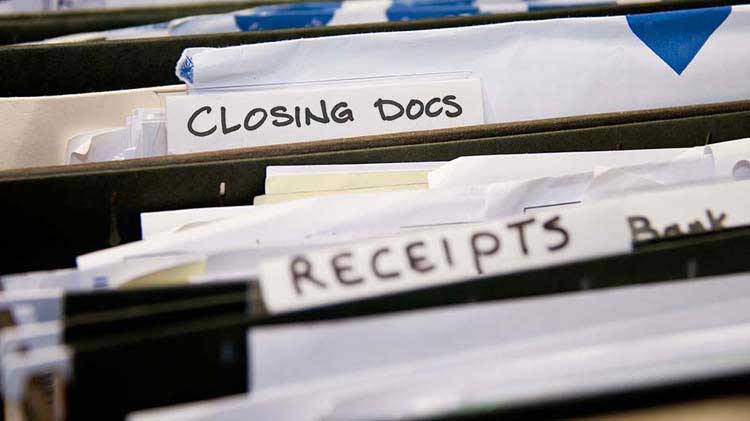Closing documents to keep after purchasing a house
A guide to the closing documents and other important household documents to keep after buying your house — and what you can consider getting rid of.
Navigating the paperwork and process when buying a home can be overwhelming. There are several documents needed for a mortgage application, such as pay stubs, bank statements and tax returns. Once everything is settled, it is important to save certain documents related to your house closing. Here are some tips on what to retain and why, and for how long.
Closing documents for buyers
Buying a house can include lots of closing paperwork. Below are some documents you will likely receive as copies as you go through the closing process. After reviewing this list, continue reading to figure out what you should keep and what you can get rid of.
- Loan application — provides a copy of the loan application you reviewed at closing.
- Loan estimate — defines the parameters of your estimated monthly mortgage payment, closing cost details, your interest rates, property appraisal and homeowner’s insurance.
- Closing disclosure — outlines the details and cost of the mortgage such as the loan amount, interest rate, monthly mortgage estimate and closing costs.
- Mortgage note — also known as a promissory note, this contract states the buyer will pay the lender the amount borrowed for the purchase of the home.
- Escrow account statements and documentation — outlines the amount of your monthly mortgage payment which covers property taxes, homeowners insurance and private mortgage insurance premiums.
- Proof of homeowners insurance — once you own the home, you’ll provide this documentation to your lender. This includes your home insurance policies and declarations page from your insurance company.
- Deed — provides you the ownership of the home, from the seller to the buyer.
- Title — describes the rights of the owner for the home.
Consider keeping for one year
- Utility bills — once you've matched actual expenses to those that appear on your bank or credit card statements, you can dispose of utility bills at the end of the calendar year.
- Change of address confirmation — when you purchase a house, you usually need to update your address with USPS to have your mail sent to your new house. You can shred the confirmation after you begin receiving the forwarded mail at your new address.
Get a homeowners insurance quote
Want to protect your home?
Consider keeping indefinitely
- Home improvement purchases and receipts — you may not intend on selling your home anytime soon, but keep proof of purchases and upgrades you make, like adding new appliances or fresh drywall. They're helpful to demonstrate appreciated value to future buyers. If you make larger improvements such as replacing the roof, proof of the expense may help reduce your taxes the year you sell your house.
- Insurance policies — store insurance documents in a safe spot so you can access account numbers and coverage limits, as well as agent contacts, at any time.
- Mortgage documents — keep any mortgage papers you get when purchasing your home. If you pay off the mortgage, you'll receive a release or certificate of satisfaction; keep that, too.
- Home inventory — a home inventory can be done once you move in and is especially helpful if you have any homeowners or property insurance claims. Try to keep it up to date on a regular basis.
Consider keeping until you sell your home
- Closing documents — retain a copy of any document signed during your home's closing as a backup. It may be beneficial to keep this collection of forms for several years after you eventually sell the home. A list of closing mortgage documents include:
- Purchase agreement
- Addendums
- Disclosures and repair requests
- Home inspection reports
- Escrow information
- Closing statement
- Abstract, title, appraisals and deed — retain your own record, which outlines things such as legal boundaries and the history of your home.
Consider keeping until it expires
- Home warranties — keep these documents in a protected location so you have access to coverage and limitation information.
Remember to keep all important documents in a dry, safe place. Many homeowners choose to keep them in a safe or safety deposit box. Knowing what to keep is easier when you know what to save or shred.
Consider contacting a State Farm® agent about homeowners insurance coverage and available discounts when going through the home buying process.




